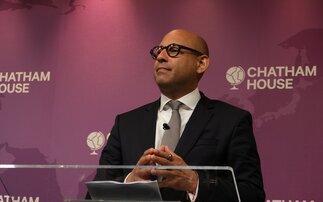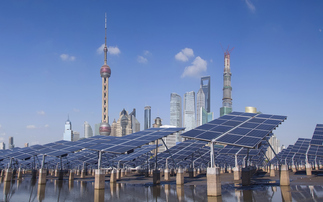
Credit: UN Climate Change / Kiara Worth
Belém Summit provided important progress, but the market signals were compromised by petrostate wrecking tactics - the onus is now on leading governments and businesses to deliver the climate action that is so desperately needed
The battle of narratives was underway well before the gavel came down. Nearly 24 hours later it is still raging, and it is not yet entirely clear who will win.
There are three interlocking components of COP Summits that are important: the complex formal negotiations and the dense texts they produce; the so-called Action Agenda, accompanying trade show, and myriad policy and investment announcements that happen on the sidelines; and the vibes these two parallel processes deliver - does the COP lead headlines? What signals does it send to policymakers, business leaders, investors, and the wider public? Is anyone paying attention and what conclusions do they draw?
Despite what its detractors say, the diplomatic process and the resulting texts really matter. They underpin the whole thing and demonstrate governments' seriousness - or lack thereof. The trade show is also increasingly vibrant, serving to mobilise billions of dollars of climate investment, pioneer new decarbonisation approaches, and create coalitions of the willing for co-ordinating policy measures.
But if the ultimate goal of the COP process post-Paris Agreement is to engineer and support changes in the real economy to drive down emissions in line with keeping temperature increases 'well below 2C', then the way the summit sends signals to governments, businesses, and investors is the most important component of the whole exercise. Does the final outcome help shift investments, change understanding of risk, and strengthen the sense of inevitability around the net zero transition?
If a summit is perceived as a failure, then it has failed. If it is seen as a success, then that is what it is. This is not particularly great news for COP30.
There were undoubtedly elements of success from Belém that thousands of people worked round the clock to deliver. The central Mutirão Decision Text pushed climate adaptation up the agenda and delivered a new target to treble levels of funding, albeit by 2035 rather than 2030. There was a new just transition mechanism and gender action plan, which were warmly welcomed by civil society groups. There was the promise of more talks about how to boost flows of climate finance and accelerate decarbonisation efforts. Crucially, the talks did not collapse - this is not a scenario where 'no deal is better than a bad deal' - and there was clear evidence the vast majority of countries remain committed to the Paris Agreement.
Outside the negotiating rooms, analysts reckon the Action Agenda delivered $1.8bn to support Indigenous peoples' land claims, $590m for methane-reduction efforts, $20bn of funding for oceans, and $82bn in annual investment for grids and storage projects, alongside numerous other initiatives. Best of all, there was at least $9.5bn for forest protection and the launch of a potentially transformational new Tropical Forest Forever Facility that promises to incentivise governments to keep forests standing.
But even the most ardent supporters of the COP process struggled to present this as anything but thin gruel when set against both the scale of the climate crisis and the goals for the summit set by the Brazilian presidency. In this regard the talks objectively failed on their own terms.
The primary goals, established early in the summit, were increased adaptation funding, more clarity on how to meet climate finance goals, mechanisms for strengthening national climate action plans, and the roadmaps for transitioning away from fossil fuels and ending deforestation proposed to much fanfare by President Lula. Only the first of these was delivered, and even then with caveats. On climate finance and closing the global emissions gap there was just the promise of more talks about talks. The push for new roadmaps failed, as it was always likely to, broken on the rock of implacable Saudi opposition.
From this distance, the abiding impression from the summit is that the petrostates currently have the whip hand in these negotiations and are not afraid to use it. The emergence of what veteran COP watcher Michael Jacobs calls the "axis of obstruction" has really weakened the signals COPs are able to send to markets and governments. A small group of fossil fuel reliant nations really do not want decarbonisation efforts to accelerate - and they can now rely on US support. Any positive signals, around how clean tech progress is continuing to accelerate and most countries want to see bolder action, were then further diluted by the clear drop off in media reporting on this COP.
The extent to which the vibes around the final agreement were off was apparent in the reaction.
Climate, nature, and development groups invariably - and rightly - respond to COP agreements by condemning the inadequacy of the pledges in the face of a global mega-crisis. But this year's criticism was particularly pointed. For campaigners, it was a COP that "failed to rise to the occasion", "a carousel of illusions" that resulted in "a document that is weak and lacking in substance".
Diplomats and those closest to the talks understandably tend towards a more optimistic interpretation. There was tangible progress and in the current geopolitical climate it is an achievement in and of itself to demonstrate that multilateral processes can continue. The message from the summit should be that the Paris Agreement remains in tact and countries are still working to deliver on its world-historic goals.
Both camps are right. But the swing voters in the post-COP narrative battle each year are the businesses, think tanks, and media outlets that are focused on how the talks play with the real economy and wider public. They did not roundly condemn COP30 as a failure, but they were disappointed and did not try to hide that fact.
"The formal outcomes of COP30 fell way short of what is needed and do not match the speed of transition in the real economy," said Maria Mendiluce, CEO at the We Mean Business Coalition. "This is a missed opportunity to further accelerate the transition and its benefits." Eliot Whittington at the Corporate Leaders Groups described "a story of slow progress and complicated politics struggling to catch up with growing green economy momentum", which resulted in a final text that was "hemmed in with weak, obscure language and was greeted with opposition by many countries questioning what was actually agreed".
Faced with such reviews - and privately there was a lot more anger at a summit that so clearly fell far short of its goals - questions will inevitably be asked about what happens next?
There will be renewed calls for the COP process to be dropped or completely reimagined. But such proposals remain flawed on the simple grounds that if COP did not exist it would have to be invented. The scale of the free rider problem that afflicts all forms of climate action means there is still huge value in multilateralism and the pursuit of unanimous agreement, even if it tends to result in weak, lowest common denominator deals.
But there does need to be an even more concerted effort to isolate the worst of the blockers, build wider alliances and try and identify the leverage and form of words that can drive the COP process forward. Industrialised nations have to find ways to ramp up climate finance and convince large emerging economies that their interests lie in a rapid clean tech transition and away from the siren calls of the petrostates. Developing economies need to continue to raise the alarm over the immense scale of the climate risks they are facing.
And beyond that there needs to be more focus on how to accelerate change in the real economy. The failure of these talks puts the onus even more clearly on leading governments, businesses, and investors to show the net zero transition can be delivered without compromising development or living standards. We're back where we were on that night in Paris, when governments reached an agreement based primarily on voluntary national action.
The leading economies and businesses most committed to climate action need to make net zero and climate resilient economies a reality. They need to destroy fossil fuel demand to the point where the Saudi wrecking tactics become irrelevant. And to do that at scale they need to make good on climate finance pledges to the developing world. The good news is it is in their economic, national, and security interests to do so.
As such, there were some grounds for optimism from Belém. It was encouraging that China was reportedly not among those blocking a more ambitious deal, with Beijing increasingly recognising its future prosperity lies in the clean tech boom. The focus on adaptation and just transition was also welcome. Over 80 countries, including many of the world's most powerful economies, do want roadmaps to transition away from fossil fuels and end deforestation. There are hopes Brazil's late proposals to lead the development of such roadmaps outside the formal COP process could turn into more than a face-saving exercise. It might yet create a path for multiple major economies to follow, which would send a clear signal to the petrostates that 'we don't want to buy your product anymore'.
These are the signals responsible and savvy businesses should recognise. Fossil fuels may have not been referenced in the final text, but their outlook remains less certain than ever before. Clean technologies are more competitive than at any point in history and are starting to destroy fossil fuel demand at scale. Global emissions will soon peak. Climate denialists such as Donald Trump and his allies may win the occasional election, but they remain inherently ridiculous figures incapable of keeping climate realities and clean tech economics at bay for ever.
The overarching goals of the Paris Agreement still make sense and are still supported by a vast majority of governments, many of which are still accelerating the transition towards a net zero economy that will prove cleaner, healthier, safer, and more prosperous for all.
The narrative from COP30 was messy, complicated, and contradictory. It contained some high profile failures that it will take time to recover from. But there is still a positive story to be told.
Sign up for BusinessGreen's COP30 webinar on 25 November, which will see top experts reflect on the outcomes and business implications from this year's UN Climate Summit.









